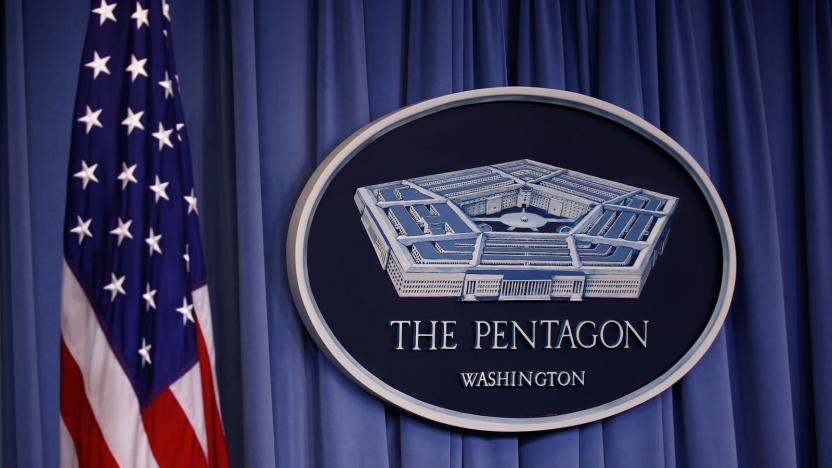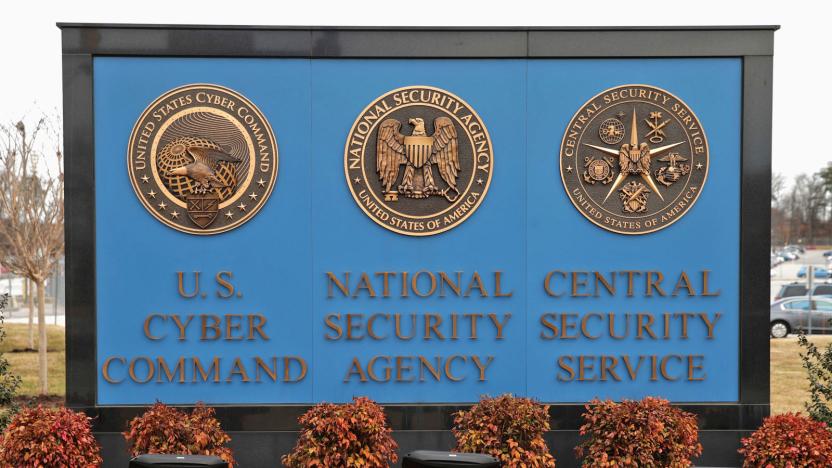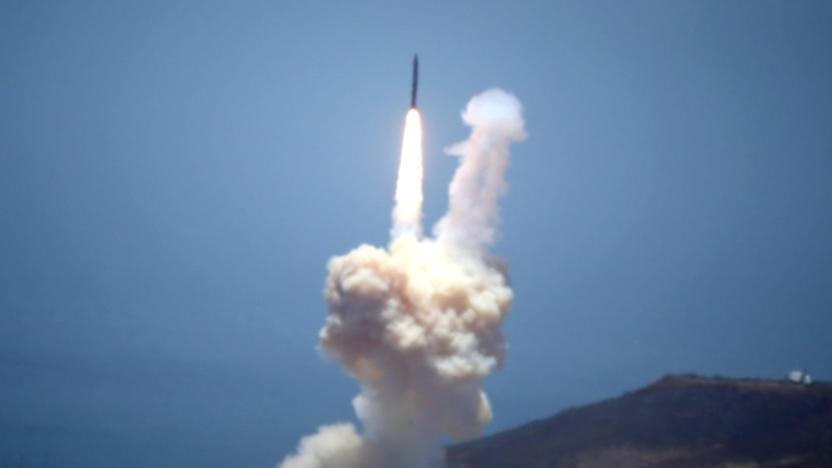departmentofdefense
Latest

Pentagon preps cyberattack in case Russia interferes with elections
There may not be any immediate evidence of Russia directly meddling with the US midterm elections, but the Department of Defense is apparently ready to strike back if it happens. Anonymous officials talking to the Center for Public Integrity and the Daily Beast say the Pentagon and intelligence agencies have agreed on the core terms of a retaliatory cyberattack in the event Russia tries a bold move. The exact nature of the attack is unsurprisingly a secret, but hackers have reportedly received authority to breach key Russian systems in advance to make sure any attack moves quickly.

Pentagon data breach compromises up to 30,000 workers
The Pentagon still has to grapple with data security woes despite efforts to harden its sites and networks. Defense Department officials have revealed that a travel record data breach at an unnamed contractor exposed the personal info of military and civilian staffers, including credit cards. An AP source said that this didn't compromise classified material, but it affected "as many as" 30,000 workers. There's a chance that number might get larger, according to the source.

Report: US weapons systems are highly vulnerable to cyber attacks
The Department of Defense will have to ramp up its cybersecurity efforts now that it's planning to spend $1.66 trillion to develop major weapons systems. According to a new report (PDF) by the Government Accountability Office, nearly all of Pentagon's weapons systems are vulnerable to cyberattacks. The DoD, the report reads, didn't make cybersecurity a priority, even though GAO has been warning it for decades about the risks it's taking by not making sure its systems are properly protected. That leaves the nation's weapons, such missiles and drones, susceptible to attacks meant to take over their controls.

White House sanctions quicker response to foreign cyber attacks
This week, the White House approved a new policy that allows the military to undertake actions that fall below the "use of force" threshold. This frees up military organizations to engage in more day-to-day "cyber operations" against foreign countries in order to protect US networks and systems, according to The Washington Post.

Pentagon pledges $2 billion for AI research
The US Department of Defense will put up to $2 billion towards artificial intelligence research over the next five years, the Washington Post reports. Steven Walker, director of the Defense Advanced Research Projects Agency (DARPA), announced the plan today at a symposium outside of Washington, DC. He said the agency wants to look into "how machines can acquire human-like communication and reasoning capabilities" and will fund dozens of new research projects going forward.

Pentagon restricts use of location-logging fitness trackers
The Pentagon is banning soldiers and others stationed at sensitive bases and warzone areas from using location features on fitness trackers and other devices because the data could give away where troops are situated. The Department of Defense is not issuing an outright ban on GPS devices and apps, but declared that the location features must be turned off in certain areas.

Trump directs Pentagon to form a Space Force military branch
It looks like the US could have a sixth military branch sometime in the future, one focused entirely on space. President Trump said during a National Space Council meeting today that he has called for the development of a Space Force, CNBC reports. "I am hereby directing the Department of Defense and Pentagon to immediately begin the process necessary to establish a Space Force as the sixth branch of the armed forces," he said. "Our destiny beyond the Earth is not only a matter of national identity but a matter of national security."

Senate bills would make quantum computing a priority
There's a worldwide race to dominate quantum computing, and two new pieces of legislation might help the US claim the lead. Senator Kamala Harris has introduced the first, the Quantum Computing Research Act, to provide a "competitive edge" in development. It would create a Quantum Computing Research Consortium in the Department of Defense to coordinate progress, offer grants and oversee initiatives. The measure would boost the economy, create jobs and bolster national security, if you ask Harris.

Defense contractors took an explosive drone on a Delta flight
Employees from AeroVironment allegedly brought a drone with explosives attached to it in a carry-on bag, on a Delta flight in April 2015. As Bloomberg reports, the flight had 230 passengers and when another employee, Mark Anderson, discovered this and reported it to the Department of Defense a month later, he said he was punished, stripped of his responsibilities and then fired without a severance package.

The uncovering of a fake Russian pundit
At this point in history, you probably wouldn't be surprised if I told you that the guy who owned Jared and Ivanka's Washington home was just uncovered as the ringleader behind what some believe is a Russian counterintelligence operation. But you'd still have to admit that it's pretty weird. In an exhaustive, thorough investigation published this week, indie journalism site Bellingcat uncovered a new twist to the many Russian propaganda soapboxes using social media to sow unrest and inflame the Russian-American conflict. Like propaganda front "Black Matters US," it looks like wealthy, well-connected, financially shady Russian-born American neoconservative Dan K. Rapoport led the team behind the fake "Senior Pentagon Russia Analyst LTC David Jewberg."

Google is helping US military train AI to study drone footage
The US military's Project Maven is getting some help using AI to interpret drone footage from a not-entirely-unexpected source: Google. The company has confirmed a Gizmodo report that it's offering TensorFlow programming kits to the Defense Department as part of a pilot that helps Project Maven process the glut of drone footage quickly. Google stresses that the machine learning technology is involved in "non-offensive uses only," and that it's flagging material for "human review." This isn't helping with drone strikes, then, but it has still raised concerns inside Google's ranks.

FDA approves blood test that determines severity of concussions
The FDA announced this week that it has approved a blood test that can quickly and reliably detect signs of a concussion. Typically, when someone seeks medical care following a head injury, they're subjected to a neurological test and/or a CT scan. However, CT scans can only detect bleeding or swelling in the brain, and for injuries that are more minor but still serious, those scans aren't terribly useful. Additionally, if CT scans don't spot anything, and in many cases they don't, the person undergoing the scan has been subjected to unnecessary radiation and, usually, an unneeded expense.

Pentagon reviews policy after fitness app reveals military locations
Yesterday, reports surfaced that a heat map released by fitness app company Strava showed the locations of US and other countries' military. While most of the locations spotted, including Afghanistan and Syria, are known to host US military bases, it still highlights the fact that information the Department of Defense would prefer remain under wraps could find its way out into the open. It also demonstrates that fitness apps could pose a security threat if location information isn't correctly handled. Now, Reuters reports, US Defense Secretary Jim Mattis has ordered a review of the situation.

Pentagon funded UFO identification program for 5 years
Recent UFO research isn't just the work of the X-Files or former pop punk stars. The New York Times has learned that the US Department of Defense quietly funded a program (Advanced Aerospace Threat Identification) designed to explain UFO reports. The program was initially funded in 2007 at the behest of Senator Harry Reid, and sent most of its money ($22 million per year) went to an aerospace firm run by his friend Robert Bigelow, who's "absolutely convinced" UFOs have visited Earth and has been making inflatable habitats for NASA. The money stopped flowing in 2012, but the program is technically active to this day.

DARPA is engineering plants to act as biohazard sensors
Researchers at DARPA, the DoD's arm that focuses on developing new technology for military application, have long been trying to figure out the best way to transmit timely information, focusing on electronic and mechanical sensors to do the job. After all, it's crucial to any military action. But it turns out that the Defense Department might have been barking up the wrong tree. DARPA's new Advanced Plant Technologies (APT) program is aimed at growing plants that can function as spies.

Pentagon left public intelligence gathering data on exposed server
Even intelligence gatherers aren't immune to making mistakes that leave data wide open. Researchers at UpGuard have revealed that the US military's Central Command and Pacific Command left "at least" 1.8 billion collected internet posts exposed on a misconfigured Amazon Web Services S3 server. Some of the data goes as far back as 2009. There doesn't appear to be any private content in the mix, and it's not clear that malicious intruders accessed it before the Department of Defense locked things down on October 1st (after notification from UpGuard). However, the exposure still raises concerns about both the government's approach to security and the kind of information it's collecting.

Russian hackers reportedly stole NSA cyber defense material
The Wall Street Journal reports today that Russian hackers stole documents detailing how US agencies defend their networks against cyberattacks, how they breach foreign networks and the computer code they use to do so. Sources told the publication that the stolen files were identified through Kaspersky security software used by an NSA contractor that had taken classified material from the NSA and saved it on his come computer.

Kaspersky offers code to prove it's not a Russian stooge
Kaspersky Lab is understandably worried that it might lose US government contracts over fears that it's in bed with the Russian government, and it's making a dramatic offer in a bid to keep the money flowing. Founder Eugene Kaspersky tells the AP that he's willing to provide source code to prove that his online security company isn't a Trojan horse for Russian spies. He's ready to testify in front of Congress, too -- "anything" to show that his company is above board.

Draft defense bill would ban Kaspersky's security software
American officials are worried that Russian software could be used to compromise national security, and they aren't taking any chances. A draft version of the Senate's National Defense Authorization Act, which greenlights military funding, explicitly bans the Department of Defense from using Kaspersky Lab's security software over concerns that it could be "vulnerable to Russian government influence." Senator Jeanne Shaheen, who added the clause, believes Kaspersky "cannot be trusted" to protect the US' critical infrastructure. The links between the company and the Russian government are "very alarming," she says.

US successfully shoots down a (simulated) ICBM
American missile defense systems haven't always worked out according to plan, but it's chalking up a major success right now. The Department of Defense reports that the Ground-based Midcourse Defense portion of its anti-ballistic missile system has managed to shoot down an "ICBM-class" target during a test. The dry run saw a ground-based interceptor rocket (above) launch from California's Vandenberg Air Force Base and use an exo-atmospheric kill vehicle (a 5-foot machine deployed from the tip of the rocket) to take down the simulated weapon while it's in space. This is the first live-fire test of GMD, the Defense Department says, and it shows that the US has a "capable, credible" deterrent against intercontinental missiles.






